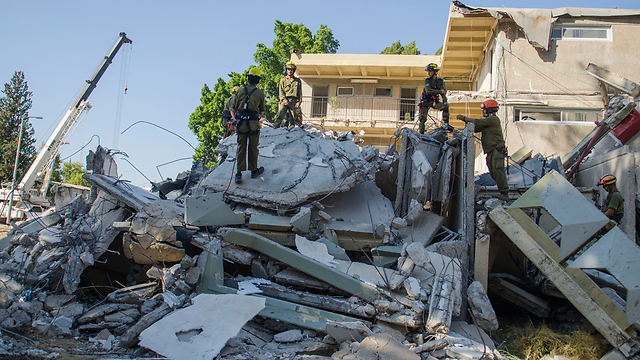
Defense budget crisis: Major training exercise postponed
Security officials cite lack of funds as reason for delay of major exercise; 'This is just the reality of the situation'.
In wake of fierce debates over an unfolding defense budget crisis, the Ministry of Defense reported Friday afternoon that a yearly training exercise for national emergencies that was supposed to take place next month has been postponed, perhaps indefinitely due to lack of funds.
A senior defense source said, "The delay of this exercise is the first step on the road to an almost complete freeze of all training exercises in the IDF and the defense apparatus due to budget constraints."

The Ministry of Defense noted that they hoped to hold the exercise sometime in the coming fall, but the source still noted the seriousness of the situation.
Related Stories
"This isn't a game and we aren't trying to scare people. This is just the reality of the situation," he said.The yearly drill known as 'Turning Point 8' is normally the biggest emergency exercise of the year helping to train the Home Front Command, the Prime Minister's offices, local authorities, the education system, the police, the fire-department, Magen David Adom, and the electric company to be prepared for war and the launching of rockets into Israel.
The Ministry of Defense explained that the decision by Defense Minister Moshe Ya'alon and Chief of Staff Benny Gantz was reached in light of the budget crisis faced by the IDF and the rest of Israel's security apparatus.
US Aid
Meanwhile, Israel is pressing the United States to conclude a deal extending defense aid beyond 2017, when Washington's current $3 billion annual payouts to its Middle East ally expire, officials said on Friday.
They said a swift agreement on future US grants would help Israel's military draft a five-year austerity plan accommodating Prime Minister Benjamin Netanyahu's conservative government.
"It's difficult to budget into 2018 and 2019 without knowing what funds will be available," an Israeli defense official said.
Yet some are saying that even with an extension of fund from the US, defense officials won't be able to plan so far ahead considering that in the last year NIS 4.5 billion was cut from the budget and the IDF had to create a 6-month plan and in the middle of the year were forced to plan the next.
Until a few years ago, the IDF had a four year defense budget plan, but since Gantz began his tenure as Chief of Staff, the organization that is supposed to be capable of looking a whole decade ahead has been forced to work one year at a time.
Big Spending
In light of the unfolding budget crisis, others are sure to begin questioning Israel's planned purchase of 19 generation 5 F-35 fighter jets from the US at a total cost of $2.7 billion.
While manufacturers at Lockheed Martin have promised that the aircraft represents a tremendous leap forward in air combat technology, the project has hit several snags delaying production and forcing prices skyward.
Recent reports even claim that the stealth capabilities of the plane, one of its key technological advancements, are being down-played in favor of weapons accuracy.
Lockheed Martin said that they planes to be sold to Israel in 2016 will have full stealth capabilities as promised.










